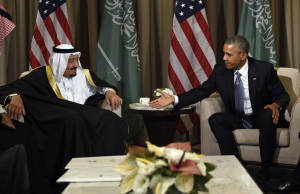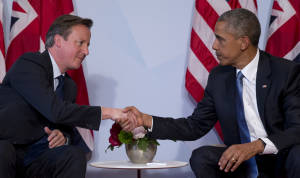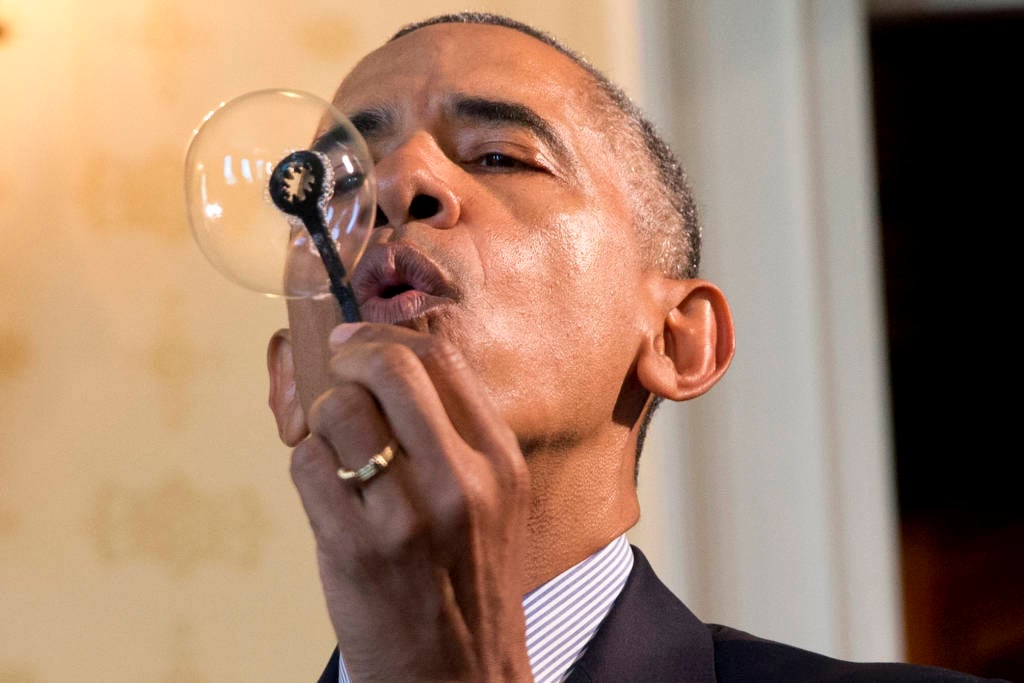
US President Barack Obama reaches out to shake hands with King Salman of Saudi Arabia. (AP/Susan Walsh)
Visiting three major allies, the president is likely to face as many jeers as cheers.
President Barack Obama will drop in on three of America’s most important allies this week, possibly for the last time. But he isn’t expecting an adoring reception in any of them.
The U.S. relationship with all three nations is distressed, and Obama will be doing more than a little damage control.
In Saudi Arabia, where he lands on Wednesday, Obama will try to soothe anger over his nuclear deal with Iran and his increasingly public complaints about the Saudi kingdom. In London, he’ll make amends for comments about British foreign policy that rattled the teacups at 10 Downing Street. And in Germany, he’ll confront one of Europe’s most anti-American moods and lingering bitterness over NSA spying in Berlin.
U.S. officials say Obama’s agenda will be proactive, bolstering efforts against the Islamic State, helping Europe deal with its refugee crisis and shoring up NATO — “a very consequential series of engagements,” as deputy national security adviser Ben Rhodes put it last week.
But Obama will also spend much of his time on the defensive.
The tensions will be highest during Obama’s first stop, in Saudi Arabia. Obama’s relationship with the Saudis has been rocky since his first, awkward visit to Riyadh in mid-2009. Things have only deteriorated since over Obama’s policy in Syria and his nuclear deal with Iran, which Saudi leaders see as the first step towards a larger U.S. thaw with their country’s mortal enemy.
People who have recently spoken to Saudi officials say that Riyadh’s annoyance with Obama has spiked since last month’s publication of a much-discussed Atlantic magazine article on Obama’s worldview, which described the president as “clearly irritated that foreign-policy orthodoxy compels him to treat Saudi Arabia as an ally.”
Obama also told the magazine that Saudis will need to learn to “share” the Middle East with their archrival Iran.
“This is kind of an awkward visit for Obama in the wake of his confessions in The Atlantic,” said David Ottoway, a Middle East scholar at the Wilson Center in Washington. “These are fighting words back in Riyadh, so I’m sure they’re going to ask him about what he means by these comments — and they will defend themselves.”

US President Barack Obama and British Prime Minister David Cameron. (AP/Carolyn Kaster)
The same Atlantic article also caused a fuss in London — hardly a capital accustomed to jibes from Washington — thanks to some less-than-reverential Obama comments about British Prime Minister David Cameron.
The magazine reported that Obama had recently insisted to Cameron that Britain contribute its “fair share” to NATO’s budget (an agreed-upon minimum of 2 percent of British GDP) or endanger the famed “special relationship” with Washington; Obama partially blamed Cameron for the chaos of post-Gaddafi Libya, saying the British leader became “distracted” by other issues when he should have been playing a leading role in rebuilding the country; and he cited Cameron’s “failure” to win parliamentary approval for action supporting Obama’s 2013 air strikes in Syria as a key reason why Obama aborted his planned military action.
Obama officials quickly sought to mitigate the damage, issuing statements and tweets about the value of the “special relationship.” But London wasn’t buying it.
“Britain’s ‘special relationship’ with the US comes under threat,” declared the Daily Mail. “Obama Savages Cameron on Libya,” blared London’s Independent.” Obama leaves Iraq in a mess, disengages from the Mid East, does nothing in Syria, Libya or Palestine & then blames us. Not much of a legacy,” tweeted Alan Duncan, a senior member of Cameron’s Conservative Party.
Rhodes noted that, since the “fair share” conversation between Obama and Cameron, the UK has increased its defense spending to 2 percent of GDP, meeting its NATO commitment. He called Britain “the opposite of a ‘free rider,’ ” a label Obama also seemed to apply to Britain in the article.
Obama can offer his own views when he holds a Friday press conference with Cameron at 10 Downing Street after lunch with Queen Elizabeth II. Obama is also likely to weigh in — at the press conference and at a town hall with young Britons the next day — on the country’s upcoming referendum on whether to withdraw from the European Union, a proposal which Obama opposes.
But Obama’s position on a so-called “Brexit” is also the subject of acrimony. More than 100 members of parliament have signed a letter telling Obama to, in effect, butt out. “It has long been the established practice not to interfere in the domestic political affairs of our allies and we hope that this will continue,” the letter declares.
The centerpiece of Obama’s trip will be a stop in Hanover, Germany, where his relationship with German Chancellor Angela Merkel is strong — the Atlantic described her as “one of the few foreign leaders Obama respects” — but where America’s relationship with the German people is not.
German Chancellor Angela Merkel speaks with US President Barack Obama. (Michael Kappeler/Pool Photo via AP, File)
Obama will try to address that with a speech on Monday that Rhodes said will “step back” and “review” the relationship, which has been tested by recent revelations of U.S. spying in Germany, including NSA monitoring of Merkel’s personal phone, and disdain towards what many Germans see as a militaristic U.S. foreign policy: A June 2015 Pew Research Center poll found that Germans have only a slightly positive attitude of the U.S. overall, with just 50 percent viewing America favorably and 45 percent unfavorably.
Though well above the 31 percent favorable rating the U.S. enjoyed at the end of the Bush era, that is by far the most negative view of America among the major European nations Pew polled. And it means Germany views the U.S. only slightly more favorably than does China, where Pew found the U.S. registering a 44-49 favorable-unfavorable rating.
It is also something of a letdown for Obama in a country where he drew a crowd of 100,000 when he spoke at Berlin’s Brandenberg Gate as a presidential candidate in the summer of 2008.
“I know my country has not perfected itself,” Obama said in that speech. “At times, we’ve struggled to keep the promise of liberty and equality for all of our people. We’ve made our share of mistakes, and there are times when our actions around the world have not lived up to our best intentions.”
That’s a theme Obama will likely return to when he addresses the German people — as he works to assuage one of several disgruntled allies in the coming days.
By: Michael Crowley, Politico
Do You Love Israel? Make a Donation - Show Your Support!
Donate to vital charities that help protect Israeli citizens and inspire millions around the world to support Israel too!
Now more than ever, Israel needs your help to fight and win the war -- including on the battlefield of public opinion.
Antisemitism, anti-Israel bias and boycotts are out of control. Israel's enemies are inciting terror and violence against innocent Israelis and Jews around the world. Help us fight back!
